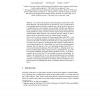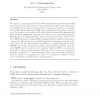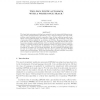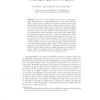14 search results - page 2 / 3 » Tree-walking automata do not recognize all regular languages |
CONCUR
2001
Springer
14 years 1 months ago
2001
Springer
A key issue in the design of a model-checking tool is the choice of the formal language with which properties are specified. It is now recognized that a good language should exten...
CORR
2007
Springer
13 years 8 months ago
2007
Springer
We propose a computing model, the Two-Way Optical Interference Automata (2OIA), that makes use of the phenomenon of optical interference. We introduce this model to investigate th...
JALC
2007
13 years 8 months ago
2007
The basic finite automata model has been extended over the years with different acceptance modes (nondeterminism, alternation), new or improved devices (two-way heads, pebbles, ...
ICALP
2010
Springer
14 years 1 months ago
2010
Springer
We propose a new approach to the notion of recognition, which departs from the classical definitions by three specific features. First, it does not rely on automata. Secondly, it...
MLG
2007
Springer
14 years 2 months ago
2007
Springer
We give a universal kernel that renders all the regular languages linearly separable. We are not able to compute this kernel efficiently and conjecture that it is intractable, but...




